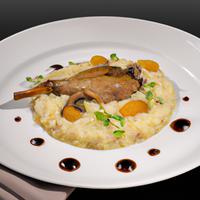
1 serving (250 grams) contains 400 calories, 20.0 grams of protein, 15.0 grams of fat, and 45.0 grams of carbohydrates.

Log this food in SnapCalorie

Nutrition Information
Calories |
377.4 | ||
|---|---|---|---|
% Daily Value* |
|||
| Total Fat | 14.2 g | 18% | |
| Saturated Fat | 4.7 g | 23% | |
| Polyunsaturated Fat | 0 g | ||
| Cholesterol | 47.2 mg | 15% | |
| Sodium | 566.0 mg | 24% | |
| Total Carbohydrates | 42.5 g | 15% | |
| Dietary Fiber | 1.9 g | 6% | |
| Sugars | 1.9 g | ||
| protein | 18.9 g | 37% | |
| Vitamin D | 0 mcg | 0% | |
| Calcium | 47.2 mg | 3% | |
| Iron | 1.9 mg | 10% | |
| Potassium | 283.0 mg | 6% | |
* Percent Daily Values are based on a 2,000 calorie diet. Your daily values may be higher or lower depending on your calorie needs.
Food Attributes
Source of Calories
About Duck resotto
Duck Risotto is a refined dish blending tender duck meat, creamy Arborio rice, rich broth, white wine, and aromatic herbs like thyme or rosemary, often garnished with Parmesan cheese. This dish originates from Italian cuisine, where risotto serves as a staple, showcasing the art of slow cooking to achieve its signature creamy texture. Duck provides a robust flavor and is a good source of protein, iron, and B vitamins, though its fat content is significant, contributing to a richer calorie profile. Arborio rice delivers energy through its simple carbohydrates but lacks the fiber found in whole grains. The dish often incorporates fresh vegetables, elevating its vitamin and mineral content. While Duck Risotto is indulgent and satisfying, it is best enjoyed in moderation due to its high-fat and calorie content, especially if made with rich butter or cheese-based additions. Perfect for special occasions, it epitomizes comfort food with a gourmet twist.



